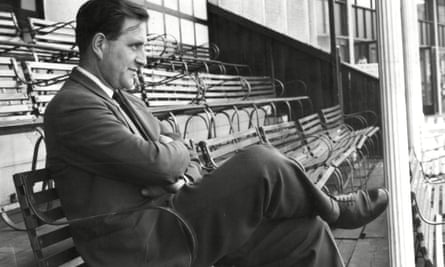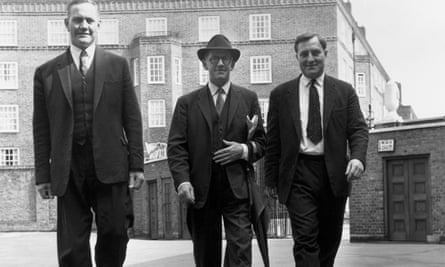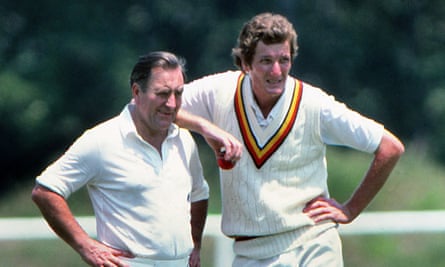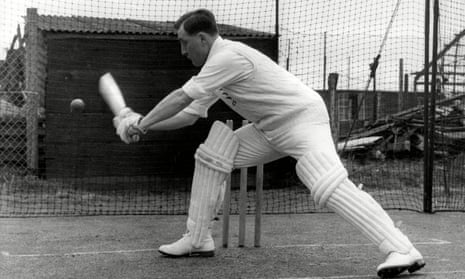Of all the decisions associated with the influential cricket administrator Doug Insole, none was more contentious than his announcement that the mixed race – in South African terms, “coloured” – all-rounder Basil D’Oliveira would be left out of the England party to tour apartheid South Africa in 1968-69. As chairman of selectors, Insole, who has died aged 91, justified the omission on the grounds that “we’ve got rather better than him in the side”. But D’Oliveira had just scored 158 in the final Test of England’s home series against Australia and there was a widespread suspicion that he had been left out to appease the South African government.
The decision to omit D’Oliveira was not Insole’s alone – four other selectors and five senior MCC advisers were involved. But much of the consequent opprobrium fell upon his head. In the face of a fierce national backlash, D’Oliveira was eventually brought into the squad, leading South Africa to call off the series and sending them into cricketing exile until the fall of apartheid in 1994.
It was a matter of regret to Insole that his name became so closely linked with the D’Oliveira affair, but the minutes of the selection meeting went missing, and as Insole was generally too discreet to talk about the issue for years afterwards, he failed to build a robust case in his own defence. That allowed the impression to persist that the selectors had, at the very least, bowed to behind-the-scenes pressure not to cause a diplomatic incident by selecting D’Oliveira.

In his long career as an administrator, the D’Oliveira affair was far from being Insole’s only headline-grabbing activity. A year earlier, in 1967, he had presided over a decision to drop Geoffrey Boycott from the England side immediately after he had scored 246 in a Test match against India – justifying the decision on the basis that Boycott had batted in a “selfish” manner. In 1978, as chairman of the Test and County Cricket Board (TCCB), he was instrumental in banning every cricketer who had signed up to Kerry Packer’s breakaway World Series cricket circus from playing in the first-class game in England, a decision overturned in the high court.
Born in Clapton, east London, to John and Margaret Insole, he grew up in nearby Highams Park in what was then semi-rural Essex. After serving with the army for two years from 1944 he began studying history at Cambridge, where from 1947 he played first-class cricket as an unorthodox, forceful middle-order batsman both for the university and, once term-time had ended, for Essex.
After three seasons at Cambridge, the last as captain, he joined Essex full-time as an amateur in 1949, working in the off-seasons as a public relations officer for the construction firm George Wimpey. He headed the county’s batting averages in 1948 and played one match for England in 1950. In 1951 he took over the Essex captaincy and led the county for the next nine years in adventurous fashion, generally pursuing victory even at the risk of defeat. Under his leadership Essex transformed themselves from county championship also-rans into respectable top-half contenders with a reputation for bright cricket.
On the back of some excellent form in 1955, when he scored 2,427 runs and nine centuries, Insole was rewarded with an England recall in the fourth Test against South Africa at Leeds that summer, making 3 and 47. But he had to wait another year for his next Test, also at Leeds, against Australia in 1956.

Having been named one of the Wisden cricketers of the year in 1956, he was appointed as England’s vice-captain for the 1956/57 tour to South Africa. As deputy to a fellow amateur, Peter May, he played in all five Tests, scoring a century in the third at Durban and topping the England batting averages for the series, which England won. Yet after the first home Test against West Indies in the summer of 1957, in which he managed only 20 and 0, he never played for his country again, having featured in only nine Tests, with an average of 27.20.
Insole continued to play eye-catching cricket with Essex, but having handed over the captaincy to his friend Trevor Bailey in 1960, he called it a day in 1963. In 450 first class matches he scored 25,241 runs at 37.61, with 54 centuries and a best of 219 not out. For much of his career he also played a high standard of amateur football, appearing on the right wing for Corinthian Casuals at Wembley in the 1956 FA Amateur Cup final.
Accomplished as his playing career was, however, it was as an administrator that Insole really made his name. He joined the MCC committee in the mid-1950s as a player and, apart from an occasional short break, served the committee across 38 years until 1994, returning for a year as MCC president in 2006/07.

He also became a Test selector while playing with Essex in 1960, remaining in the job until 1979 and serving as chairman of selectors from 1965 until 1968. He was chairman of the TCCB from 1975 until 1978, and managed England during their 1978-79 and 1982-83 Ashes tours to Australia. At Essex he was chairman from 1976 until 1978 and president from 1994 until his death. Appointed CBE in 1979 for services to cricket, from 1975 until 1991 he was also marketing director of the construction company Trollope & Colls.
His wife Barbara (nee Ridgway), whom he married in 1948, died in 1982. One of their daughters was killed in a plane crash in 1979. He is survived by his partner, Norma, and two daughters.
